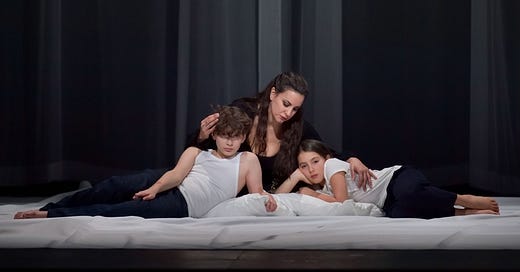Incandescent Médée
Joyce El-Khoury sings commandingly in the Opéra-Comique's staging of Cherubini's original French version
Deceptive maternal love: Joyce El-Khoury (Médée) and her children (Félix Lavoix Donadieu, Inès Amara) Picture © Stefan Brion
Of Luigi Cherubini’s 35-plus operas, only Médée, first performed at the Théâtre Feydeau in Paris in 1797, is at all familiar today. But how well do we know this opera, written by a French-domiciled Italian composer whom Beethoven judged the greatest of his contemporaries?
In the 1950s Maria Callas championed a corrupt Italian version (Medea). Iconic in its day, it was based on a German-language arrangement which the hack-composer Franz Lachner, sometime friend of Schubert and devotee of Beethoven, made for a Frankfurt production in 1855. Lachner composed sung recitatives to replace the original spoken dialogue of François-Benoît Hoffman’s fine neo-classical libretto, in which the declaimed words have something of the rhetorical grandeur of the great 17th century French tragédiens, Corneille and Racine. But these recitatives, back-translated into Italian by Carlo Zangarini in 1909, require the sacro fuoco of a unique opera diva like Callas to bring them to life.
While the Callas version has gained traction with later sopranos - notably Magda Olivero, Leonie Rysanek, Gwyneth Jones and, more recently, Lise Davidson (an ill-conceived Wexford Festival debut in 2017) - it has hardly established even ‘bowdlerised’ Cherubini as a repertoire work, and may even have discouraged rediscovery of his original opéra-comique version (Médée with spoken dialogue).
Keep reading with a 7-day free trial
Subscribe to Operalogue to keep reading this post and get 7 days of free access to the full post archives.




